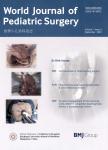The role of extracorporeal life support and timing of repair in infants with congenital diaphragmatic hernia
作者机构:Le Bonheur Children's HospitalUniversity of Tennessee Health Science CenterMemphisTennesseeUSA
出 版 物:《World Journal of Pediatric Surgery》 (世界小儿外科杂志(英文))
年 卷 期:2024年第7卷第2期
页 面:90-99页
核心收录:
学科分类:1002[医学-临床医学] 100202[医学-儿科学] 10[医学]
主 题:congenital life repair
摘 要:Extracorporeal life support(ECLS)serves as a rescue therapy for patients with congenital diaphragmatic hernia(CDH)and severe cardiopulmonary failure,and only half of these patients survive to *** costly intervention has a significant complication risk and is reserved for patients with the most severe disease physiology refractory to maximal cardiopulmonary *** contraindications to ECLS do exist such as coagulopathy,lethal chromosomal or congenital anomaly,very preterm birth,or very low birth weight,but many of these limits are being evaluated through further *** guidelines from the past decade vary in recommendations for ECLS use in patients with CDH but this therapy appears to have a survival benefit in the most severe subset of *** outcomes have been observed for patients treated at high-volume *** review details the evolving literature surrounding management paradigms for timing of CDH repair for patients receiving preoperative *** recent data support early repair following cannulation to avoid non-repair which is uniformly fatal in this *** ECLS runs are associated with decreased survival,and patient physiology should guide ECLS weaning and eventual decannulation rather than limiting patients to arbitrary run *** of care across centers is a major focus to limit unnecessary costs and improve short-term and long-term outcomes for these complex patients.



